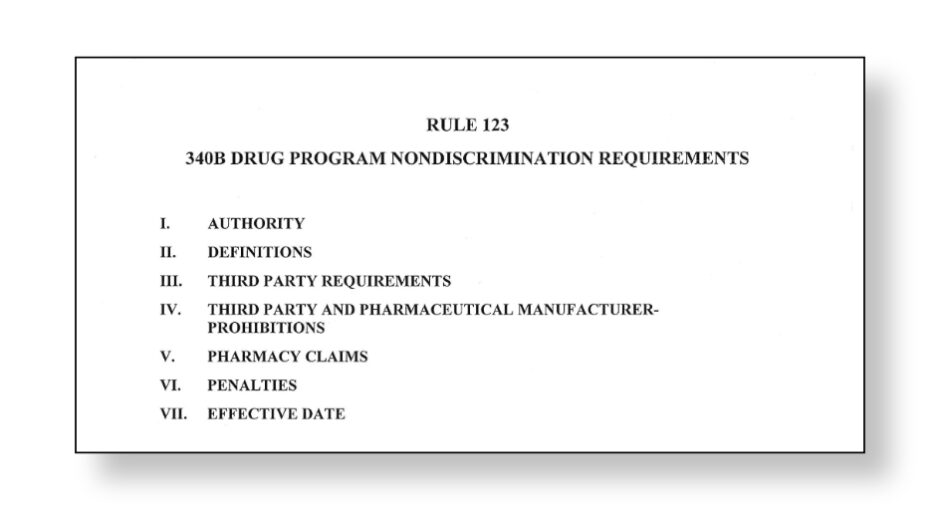The Arkansas Insurance Department (AID) published a rule this week that gives force to the state’s ground-breaking 2021 law prohibiting drug makers from denying 340B pricing or restricting access to drugs when covered entities contract with pharmacies to dispense 340B drugs to patients.
Rule 123, issued Monday, says a drug maker cannot prohibit a pharmacy from contracting or participating with a 340B covered entity by denying the pharmacy access to the drugs it manufactures. Drug companies are further barred from denying or prohibiting 340B drug pricing for an Arkansas-based community pharmacy that receives drugs purchased under a 340B drug pricing contract-pharmacy arrangement with a covered entity. Rule 123 takes effect no later than Sept. 30, AID officials said.
Pharmaceutical Research and Manufacturers of America has asked a federal district court in Little Rock to strike down Arkansas Act 1103, passed in May 2021, on the grounds that it conflicts with the 340B statute and the Food, Drug, and Cosmetics Act.
“Arkansas Act 1103 addresses two categories of activity that is harmful to 340B covered entities: (1) discriminatory payer practices that usurp the 340B benefit, such as pharmacy benefit managers paying lower reimbursement on 340B drugs; and (2) distribution limitations of 340B drugs, such as manufacturers blocking the distribution of 340B-priced drugs to Arkansas contract pharmacies,” Barbara Straub Williams, an attorney with D.C.-based law firm Powers, Pyles Sutter & Verville, which represents 340B covered entities intervening in the Arkansas case, told 340B Report. “The Final Rule 123 implements the latter protection—restrictions on distribution of 340B-priced drugs to Arkansas contract pharmacies, however, the practices that usurp the benefit of 340B pricing from the covered entity are also very important to maintaining the purpose of the 340B program.”
Williams said she was optimistic that the Arkansas law is the start of a trend to bar 340B discriminatory practices at the state level—with a caveat.
“We believe that once the Arkansas Insurance Department and safety-net intervenors prevail, other states will swiftly pass laws to protect 340B drug distribution to the pharmacies in their states,” she said. “It is also possible that the political atmosphere is some states favors the pharmaceutical industry, which is opposed to Act 1103.” A few states including Connecticut and California have tried to pass similar laws in this legislative session preventing drug manufacturers from placing contract pharmacy restrictions but those bills eventually died.
Significant Focus on Discriminatory Reimbursement
Arkansas’ Rule 123 also places a number of prohibitions on third-party payors, including insurance companies and PBMs, specifying that they cannot:
- Coerce a patient into using a mail-order pharmacy or require such use.
- Discriminate, lower reimbursement, or impose any separate terms upon a pharmacy in any other third-party contract on the basis that a pharmacy participates in 340B pricing.
- Require a pharmacy to reverse, resubmit, or clarify a 340B drug-pricing claim after the initial adjudication unless in the normal course of pharmacy business and not 340B- related.
- Require a billing modifier to indicate that the drug or claim is a 340B drug-pricing claim unless billed to the fee-for-service Arkansas Medicaid Program.
- Modify a patient’s copayment on the basis of a pharmacy’s participation in 340B pricing.
- Exclude a pharmacy from a network based on the pharmacy’s participation in 340B pricing.
- Establish network adequacy requirements based on 340B drug pricing participation by a provider or pharmacy.
- Prohibit a 340B covered entity or a pharmacy under contract with the entity from participating in a third party’s provider network on the basis of participation in 340B pricing.
- Pharmacy benefit managers cannot base drug formulary or drug coverage decisions upon the 340B pricing status of a drug, including price or availability, or whether a dispensing pharmacy participates in 340B pricing.
Another part of Rule 123 is aimed at keeping the choice of pharmacy with patients, requiring third party payors to:
- Inform a patient there is no requirement to use a mail-order pharmacy
- Obtain a signed waiver from a patient before allowing the use of a mail-order pharmacy
- Allow a patient the freedom to use any pharmacy or any provider, whether or not the pharmacy participates in 340B pricing
The rule also takes aim at a number of discriminatory contracting practices, prohibiting third-party payors from:
- Transferring 340B savings from covered entities to PBMs, private insurers, or managed care organizations.
- Offering a lower reimbursement for a drug purchased under the 340B program than for the same drug not purchased under 340B.
- Refusing to cover drugs purchased under 340B.
- Excluding 340B pharmacies from networks.
- Charging more than fair market value or seeking profit-sharing in exchange for services involving 340B pricing.


